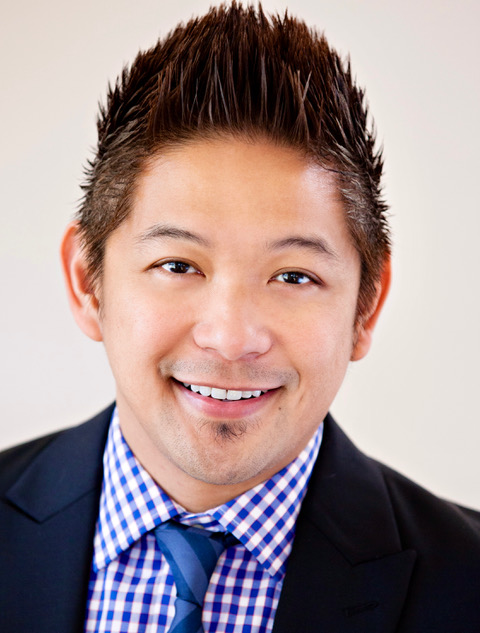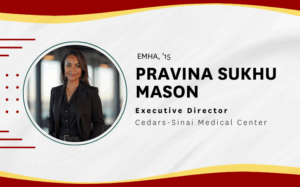James Soriano, a 2012 graduate of the USC Price Executive Master of Health Administration (EMHA) program, credits the degree with shaping his transition into a healthcare leadership role and strengthening his commitment to improving the patient experience. As a Patient Care Manager at Stanford Health Care, Soriano manages ambulatory clinics across numerous specialties. His role includes overseeing day-to-day operations, patient experience, and strategic coordination across the building.
Q: What motivated you to pursue an Executive Masters in Health Administration?
A: At the time, the healthcare landscape was changing quickly. We were seeing the impacts of Obamacare, and it was an important moment for future leaders to step up. I also knew that USC offered unmatched networking and a global reputation. Choosing USC was choosing excellence and opportunity.
The executive format was another major factor. I knew I lacked leadership experience, and the structure of the EMHA program — designed for working professionals — felt like the exact right fit.
Q: Why did you choose USC’s online EMHA program specifically? Did it align with your goal of improving the patient experience?
A: USC stood out for its excellence in leadership education and its strong connection between healthcare policy and practice. I wanted a program that [allowed] me to apply what I was learning to real challenges, not just study theory. The EMHA program balanced academic rigor with practical, real-time application, which aligned perfectly with my goal of improving patient experience across health systems.

Executive Master of Health Administration Online (EMHA)
Advance Your Career
Gain practical skills and model effective leadership in a rapidly evolving health care environment.
Find Out MoreQ: What were your healthcare leadership goals going into the program?
A: I wanted to grow into a healthcare leadership role and needed the tools to help me navigate that path. I surrounded myself with talented peers in my cohort so I could learn from them. That exposure helped me build the knowledge and confidence necessary to transition into leadership when the opportunity came.
Q: What was your academic experience with the online modality and in-person residencies?
A: The executive format is truly designed for working professionals. Whether you’re coming from nursing, tech, or another healthcare field, the curriculum prepares you for real leadership scenarios.
The in-person residencies were especially valuable. They offered insight into the inner workings of healthcare — finance, operations, C-suite decision-making — which is incredibly helpful for anyone new to the field. Another course that stood out was the negotiations class, which has been invaluable when navigating crucial conversations, especially with represented employees.
Q: How did you balance the program with your personal and professional life?

A: It requires serious commitment. You must stay disciplined, focused, and organized. The professors and school provide all the tools you need to succeed, but you have to drive the work.
For me, time management was key — using calendars, planning ahead, and staying structured. Support from your workplace is important too. I was fortunate to have supervisors who embraced my decision to pursue the program. The workload is intense — papers, exams, readings — but staying disciplined makes success possible.
Q: What was your interaction and experience with your professors like?
A: The professors were incredible. They’ve spent decades in the healthcare industry and deeply understand the landscape. I still stay in touch with several of them.
One professor helped me make a major career decision early on. I had just been offered a leadership role in Boston and wasn’t sure whether to accept. He encouraged me to take it, and that advice changed the direction of my career. The faculty create a respectful, collegial, and familial environment that continues long after graduation.
Q: What was your interaction and experience with your peers like?
A: I definitely felt like the underdog at first. Many of my peers were already senior leaders — C-suite executives, physicians, pharmacists, finance professionals. I had imposter syndrome because I had no leadership experience. But that diversity became a strength.
We learned from each other’s backgrounds and supported one another through the program. That group became a family. We still keep in touch today.
Q: What project from the program are you particularly proud of? How do you think it helped you prepare for the future?
A: The capstone project. It’s the culmination of your USC journey and truly defines you as a leader. You must invest time, coordinate with mentors, and deliver a comprehensive final presentation.
The capstone taught me how to conduct a SWOT analysis, build a business plan, develop contracts, and create a large-scale organizational proposal. It gave me the foundation I still use today in my leadership roles.
Q: What did you learn that was most impactful in your career, and how did you apply that skill?
A: The program gives you theories and processes, but more importantly, it helps you discover who you want to be as a leader. Being surrounded by talented peers helped shape my identity and purpose.
That clarity has guided me through difficult conversations and complex decisions. It helped me develop my “true north,” which I use every day in my work.
Q: What does the Trojan Network mean to you?
A: It’s exactly what people say: It’s family. Wherever you go, Trojans are there. When I lived in Boston, I met USC alumni everywhere. The Trojan Network brings together talent from all over the world and creates a sense of belonging unlike anything else.
Q: What are some perks of going to USC?
A: Beyond the academics, USC offers exciting experiences — football games, tailgating, and meeting Trojans across different schools. There are also opportunities for professional involvement. I served as the Executive MHA liaison for the USC Student Health Council, collaborating with MBA, pharmacy, and other graduate students on healthcare issues.
And for bragging rights—we helped establish the Upsilon Phi Delta national honor society chapter at USC during my time there.
Q: What advice would you give to prospective students?
A: Come in with an open mind and understand that this is an investment in your future. Yes, the program is rigorous and has a price tag, but the return on investment is tremendous. You will gain knowledge, mentorship, and a network that will support your career for years to come.
If transforming into a stronger leader matters to you, don’t hesitate.
Learn more about the USC Price Executive Master of Health Administration (EMHA).



